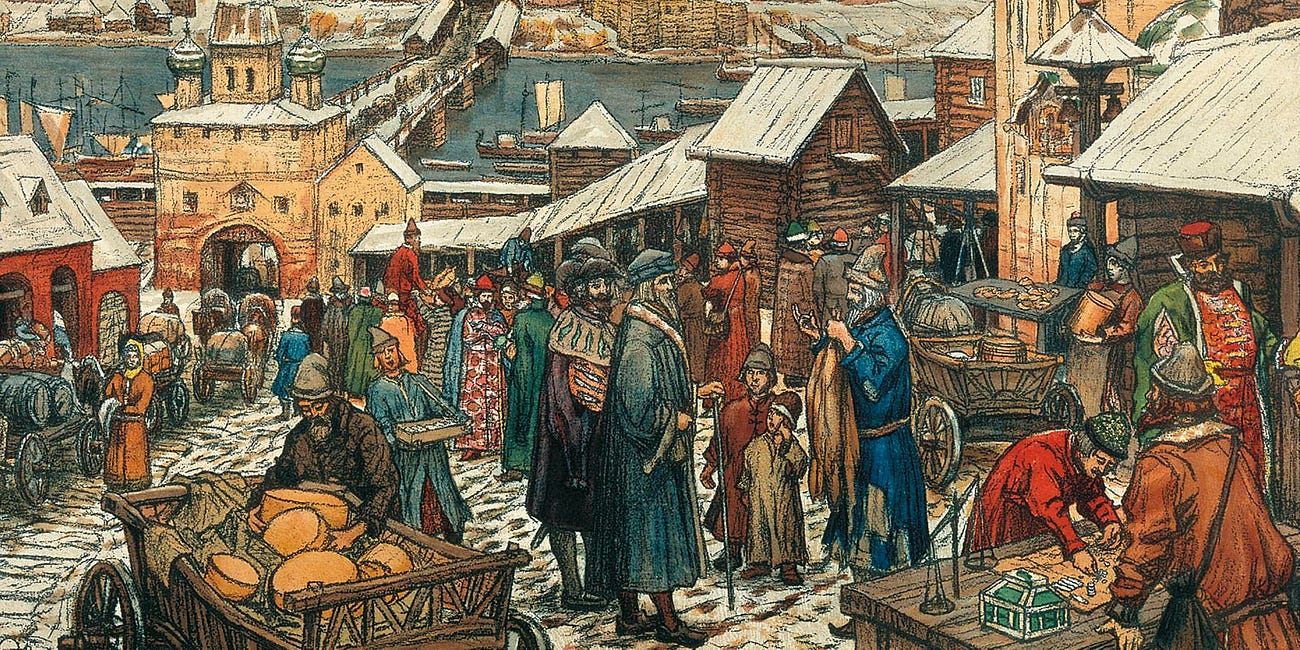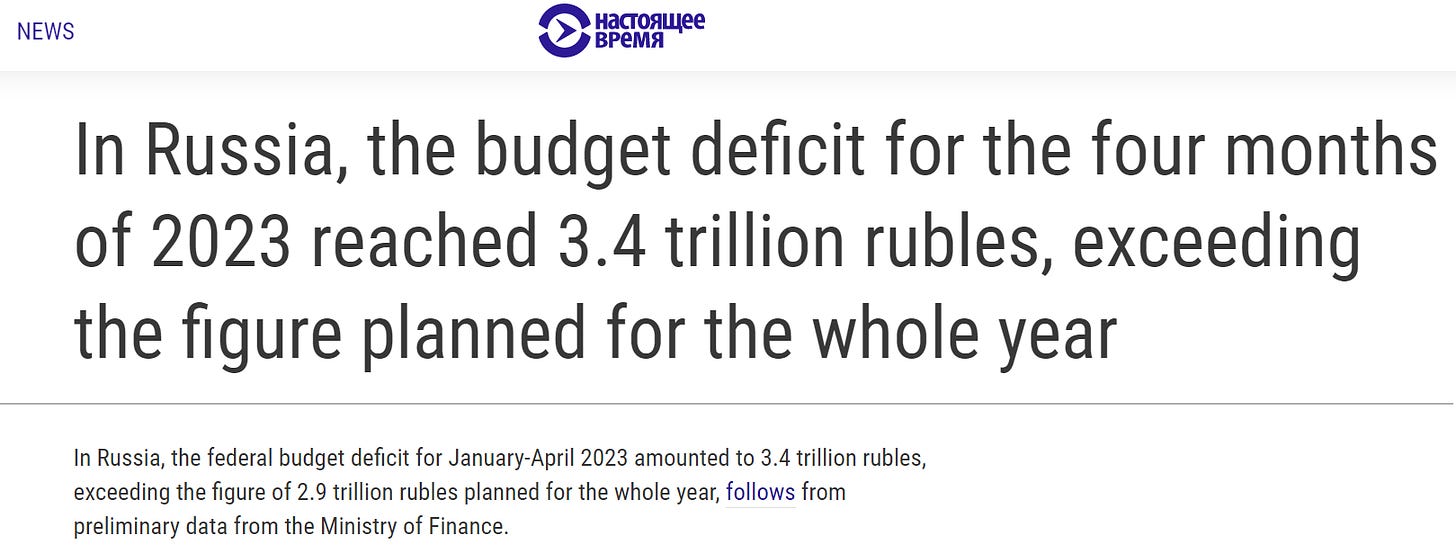
Close your eyes and imagine that the United States is swallowed by a giant sinkhole.
Within a matter of seconds, Earth is instantly and permanently dedollarized. Suddenly, as if roused from deep hypnosis, the world’s money-grubbing elites see the error of their ways, and renounce Moloch.
This great awakening is keenly felt in Moscow.
Spiritual enlightenment pulsates through Russia’s halls of power; the unapologetic nepotism, greed, cynicism, and insolence—the institutionalization of perverse untruths—all gone.
Instead of using embezzled funds to buy super-yachts with hulls that span three time zones, Russia’s judicious public servants and God-fearing “entrepreneurs” build hospitals and roads and other useful, life-nurturing things.
Nikolai Gogol predicted this wonderful turn of events in his famous novel, Dead Souls (But Once Russia Dumps The Dollar, Our Souls Will Feel Much Better).
Yes, even back in 1842, US dollar hegemony was the leading cause of needless suffering in Russia. But this multi-generational nightmare has finally come to an end.
If only Gogol could have lived to see it…
You can open your eyes now.
For far too many decades, Washington has wielded dollar hegemony to carry out a global campaign of extortion and outright terror. That is to say, our current global financial system is a bit unsound; it should be replaced with something different. It will be, eventually.
But whether the global reserve currency is the US dollar, or Pokémon cards, or a digital ruble pegged to borscht, nothing will fundamentally change for Russians if their political elites continue their time-honored tradition of stubbornly refusing to invest in Russia.
Even now, when the stakes are rather high—and becoming increasingly higher—Moscow has shown little interest in harnessing the country’s vast natural wealth for the betterment of ordinary Russians.
In fact, even as Russia is practically donating oil and gas to its many “trusted partners”, Gazprom is pursuing a policy of price “liberalization” at home. (That’s a euphemism for “unrestricted price hikes”, in case you were wondering.)
Well, there’s no such thing as discounted oil—someone, somewhere, has to pay for it. And why not the Russian people?
Dedollarization and Russia’s “turn to the East” won’t amount to much without comprehensive deoligarchization, and the adoption of a new economic model, which prioritizes domestic development and social uplift over servicing the needs of foreign “partners”.
There’s a lot to discuss. Let’s use oil-for-rupees as a springboard.
On May 4, your humble correspondent described oil-for-rupees as a face-melting farce. Mostly because Moscow was trading discounted oil for currency it didn’t need and couldn’t even use, while New Delhi sold its refined Urals crude to the West—for dollars and euros, obviously.
On May 5, Russian Foreign Minister Sergei Lavrov called an emergency press conference, and with the cameras rolling, announced that “everything Edward Slavsquat said about oil-for-rupees is absolutely 100% correct; he is a very astute and handsome young man.”
That’s a paraphrase. In Lavrov’s own words:
[Russia has] billions of rupees in Indian bank accounts, and we need to use this money. But for this, rupees must be converted into other currencies. This is being discussed.
Alas, this is not exactly news. Russian media quickly realized Moscow was getting the fuzzy end of the lollipop after this settlement scheme was introduced in mid-December.

The lopsided deal was aptly summarized by a Russian economist back in March:
A huge trade imbalance is forming in Russian-Indian trade, and Russian banks [with vostro accounts in India] are already refusing to accept rupees: they do not want to accumulate surpluses of Indian currency, since there is nowhere to use them.
In other words, it turned out that oil companies, in general, gave India “oil for nothing.”
There hasn’t been much progress towards converting Russia’s mountain of rupees into currencies that Moscow can actually use. But credit where credit is due: New Delhi announced earlier this week that it would allow Russia to dip into its stockpile of rupees to settle outstanding debts.
Of course, in an ideal world, Russia would be allowed to convert its rupees into rubles, and then use these rubles to help plug its ballooning budget deficit.
But I digress.
Oil-for-rupees (which, just to avoid any confusion, has been shelved for the time being, and was probably phased out, quietly, by the end of February) is symptomatic of a much larger economic woe.
As a result of 10,000+ Western sanctions (and an energy embargo that is not actually enforced), Beijing and New Delhi currently account for an estimated 70-90% of Moscow’s oil exports, up from 45% in August. (China deserves a separate blog post. Stay tuned.)
Because Moscow has spent the last 30 years serving as a resource conveyor belt for the West, and because the domestic market was completely neglected, Russia is now at the mercy of the East. Moscow may be pivoting to Asia, but India and China dictate the terms.
India has been inhaling Urals crude at a discount. How big of a discount? We don’t know exactly, but the Indian government disclosed last month that most of the oil supplied by Russia was bought for less than $60/barrel—below the price ceiling set in December by the G7, Australia, and the European Union.
Moscow seems to have accepted the fact that New Delhi isn’t willing to defy Western dictates: At the end of April, Russian President Vladimir Putin signed a decree allowing oil sales to “friendly countries” that comply with the $60/barrel price cap. A rather revelatory capitulation.
The mere fact that Russia agreed (even if only temporarily) to trade oil for a currency that isn’t fully convertible, and isn’t particularly useful, should be evidence enough that New Delhi is taking full advantage of the situation. And who could blame them?
Considering Russian energy majors are willing to exchange “oil for nothing”—and pay Kiev to transit gas across Ukraine—maybe they could find it in their hearts to install gas lines in Russian schools?
“Unfortunately, a large number of schools in our country have not yet been gasified. I looked at the figures: to be honest, even I was surprised—a lot [of schools are without gas],” Putin said in July.
This is not a problem limited to schools, unfortunately.
A Russian government audit published in 2020 found that hundreds medical facilities across the country were without running water or central heating.
Proposal: Gazprom should build a gas pipeline to Russia. They could call it SchoolStream.
Much of what I’ve just typed was pointed out by Sergei Levchenko, Deputy Chairman of the State Duma Energy Committee, during an interview last month with Free Press.
After Levchenko commented on the seemingly inevitable introduction of “price liberalization” at home (tariffs for gas are already raised every year, although the price is set by regulators), the interviewer turned to Russia’s “pivot to the East”:
Free Press: [Moscow] is now deploying our entire hydrocarbon pipeline, let’s call it that, to the east, to China and India. Well, there’s nothing to hide: They will take advantage of the situation, they will ask for discounts and so on. That is, it will be very painful for our domestic economy. Are such fears correct?
Levchenko: Absolutely correct … We have been trying for a long time to become the periphery not only of the West, but also of the East … We have created a situation in our country where we only serve others with the help of our hydrocarbons.
The Duma Deputy then elaborated on how this economic model came into being:
The representatives of the state work mainly for our commodity oligarchs, and they primarily search for ways to get into peoples’ pockets. As a result, we have tens of millions of people who live below and near the poverty line, and at the same time we have about 100 “dollar billionaires”. Do you think that the representatives of these dollar billionaires are going to take money from their owners? No, of course not—it is the people who should be burdened. […]
And where do dollar billionaires, who send money abroad, come from? We need to develop the country, and not allow the rich to squeeze us, to continue to make money and place it somewhere in [foreign] banks, or bury gold coins abroad. […]
We simply need to invest in the country … The [ruling elite] don’t know how to develop the country, they don’t know how to take care of the people. They only know how to squeeze and send; squeeze, send. They are great specialists here, but they were taught in the West.
(I have nothing to add here, but I sent Levchenko’s comments to Karine Bechet-Golovko, a visiting professor at Moscow State University, who had some very thought-provoking things to say. The interview will be published in the nearest future.)
Interestingly, the core of Levchenko’s argument found its way into the pages of Russian state media in March.
Russian economist Mikhail Khazin (who is very pro-Putin) told RIA Novosti:
Russia shouldn't turn to the East—it should turn inward. The turn to the East, which we are talking about so much today, is, in my deep conviction, just an attempt to plug the holes that have formed in the country after the departure of Western companies.
To summarize: It’s time for Russia to turn inward. It’s long, long overdue, really.
Thank you for reading Edward Slavsquat. Feed a hungry blogger?









Riley, another excellent report, written in your usual knowledgeable style infused with your signature humor----am so glad I renewed my subscription.
"But whether the global reserve currency is the US dollar, or Pokémon cards, or a digital ruble pegged to borscht, nothing will fundamentally change for Russians if their political elites continue their time-honored tradition of stubbornly refusing to invest in Russia."
The global reserve might even be called a "Unicoin" nah, most likely a "Unicorn" a virtual mythological currency controlled by international financiers floating throughout the planet with the possibility of being capriciously turned off with one tiny click of the finger. 🖕
That being said, everyone not just Russians are at the mercy of bankster/gangsters and techno/fascists.
Oligarchs, deplete Russian resources on the cheap and in the end Russian plebs pay the full price. And in the US,
warprofiteers pillage the treasury so that the debt ceiling is four feet tall for the middle-class, but the sky's the limit for the arms industry and the national security state.
German Chancellor Olaf Scholz an obedient vassal to the Global Empire said it best:
"If you are a good leader,” you listen to the people, but you never think they really want you to do exactly what they propose.” A dictum followed by all the mediocre nation-state managers operating within the global cartel.